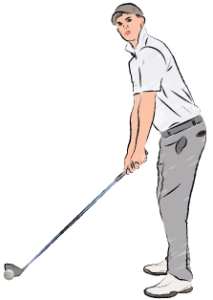The struggle against drugs or alcohol is an upward battle that can seem like walking in the sand while carrying so much weight it is hard to move a single step forward. Despite the initial challenges, it is possible to make a life-long change and avoid drugs or alcohol in the future.
Taking that first step is the foundation, but finding ways to prevent future drug abuse is essential for the future. In many cases, incorporating a passion or hobby into treatment can help prevent relapse and provide a focus that makes the process of giving up a substance a little easier.
[separator top=”40″ style=”single”]
Download the Free Guide to Alcohol Treatment[separator top=”40″ style=”single”]
What is Golf Therapy?
Before it is possible to determine if golf therapy and addiction treatment is appropriate for personal needs and goals, it is important to recognize what it is and how it works. Golf therapy is a part of addiction treatment that incorporates a hobby to help fight cravings and reduce the risk of relapsing.
Incorporating Golf Therapy into Treatment
The method of incorporating golf therapy into a treatment regimen depends on the situation and individual. Substance abuse causes physical and mental challenges, which can make it hard to find the right treatment approach for personal goals and needs.
During treatment, professionals take the time to evaluate the individual and create a plan that is personalized based on the situation.

The factors that are considered before any treatment plan is developed include:
- The current physical health of the individual after entering the treatment facility
- Mental health concerns that may contribute to substance abuse
- Past trauma
- Emotional concerns that may arise
- The ability to participate in activities
- The interests and beliefs of the individual
By evaluating the individual from several areas of life, it is possible to identify the underlying causes of the addiction and work out a plan of action that is appropriate for the individual.
Although golf therapy can help reduce the risk of relapsing, it may not be suitable for initial treatment based on the evaluation.
After determining that an individual is physically and mentally capable of playing golf, it may be introduced as part of an alternative treatment approach to fight against substance abuse. Individuals who are in recovery have the opportunity to learn the basics of golf, work on their form and play the game as a part of their treatment.
Improving the Odds of Overcoming Addiction
According to the National Institute on Drug Abuse, addictions to alcohol or drugs account for almost $600 billion in lost work, reduced productivity, criminal activity and medical expenses.
Not only is an addiction expensive, it is also difficult to fight against.

The National Institute on Drug Abuse reports, roughly 23.5 million Americans are struggling with addictions to drugs or alcohol each year. Of those individuals, only about 2.6 million, or 11.2 percent, seek treatment at an appropriate facility, states the National Institute on Drug Abuse.
The odds of seeking treatment are already low when compared to the number of individuals who are abusing drugs or alcohol. Despite the low odds, deciding to seek treatment is an important part of recovering for a lifetime.
The Substance Abuse and Mental Health Services Administration, or SAMHSA, reports that roughly 47 percent of individuals who seek treatment graduate from the program.
By admitting that a problem exists and seeking treatment, it is possible to turn around and start walking on the road to recovery. Even if the first attempt to fight against an addiction is not successful, it is still possible that new and alternative treatments might help.
Golf therapy is among the treatment options that individuals can use to become one of the successful graduates. By incorporating the physical activity into a treatment plan, individuals are taking steps to fight back and give up drugs for a lifetime.
By incorporating golf therapy into an addiction treatment, it is possible that the process of fighting back is improved.
The potential impact of including golf therapy includes:
- Reduced cravings during the initial stages of treatment
- Regaining an interest in hobbies or personal interests
- Building up the body’s physical defenses and abilities
- Improving overall health
- Providing a method of reducing stress, anxiety or other mental health concerns
Golf therapy can provide positive benefits when it comes to beating the odds. The possible applications in addiction treatment are numerous because each individual responds to treatment in different ways. In some cases, the treatment may offer a way to reduce triggers that cause cravings while other individuals will discover that the physical activity helps.
Beating the odds is possible with a treatment approach that considers every aspect of the individual. It is not only about the physical dependency, but also the emotional and mental complexities that make fighting an addiction particularly challenging.
[separator top=”40″ style=”single”]
Download the Free Guide to Alcohol Treatment[separator top=”40″ style=”single”]
